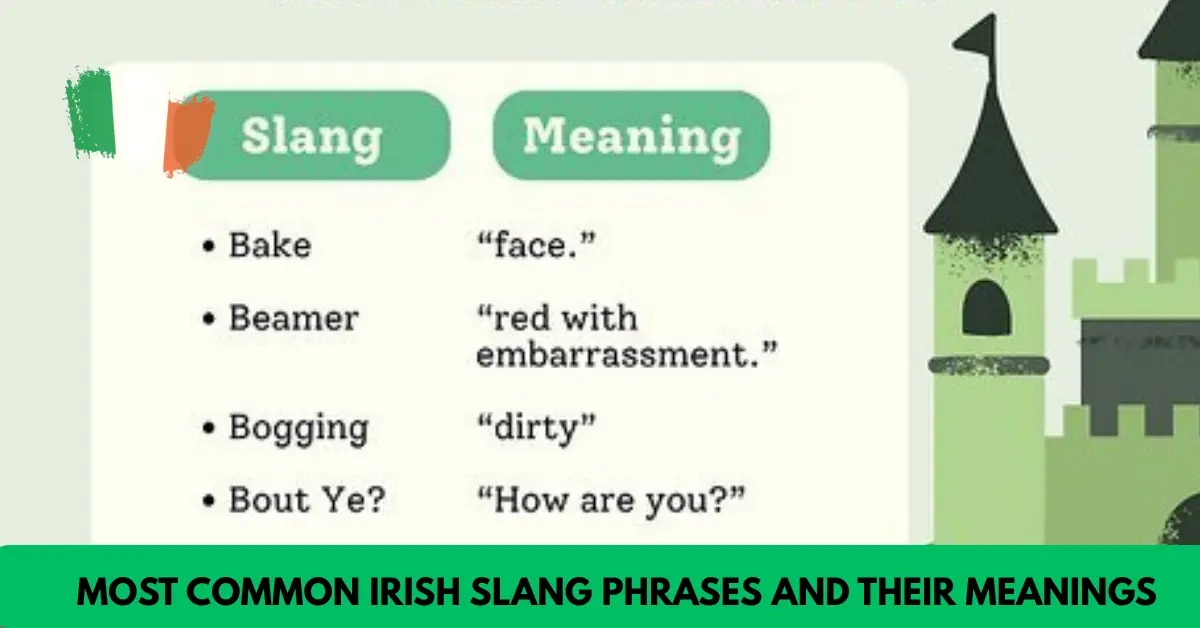Picture this. You walk into a pub in Dublin. Someone shouts, “What’s the craic?” You stand there. Confused. Lost. This happened to my American friend last year. She thought someone was asking about drugs! That’s when I realized something important. Most common Irish slang phrases and their meanings need proper explanation for visitors.
Irish slang is like a secret code. It connects people instantly. It makes conversations warmer. More authentic. In this guide, I’ll share the real meanings behind our favorite expressions. You’ll learn how to use them properly. No more awkward moments in Irish conversations. Most Common Irish Slang Phrases and Their Meanings.
I’ve lived in Ireland my whole life. I’ve heard these phrases daily. From my grandmother’s kitchen to Dublin’s busiest streets. This isn’t just a dictionary. It’s a cultural bridge. Ready to crack the code of Irish conversation? Let’s dive in.
Contents
- 1 Understanding Irish Slang: More Than Just Words
- 2 Essential Irish Slang Phrases Every Visitor Should Know
- 3 Irish Slang for People: Terms of Endearment and Description
- 4 Quintessentially Irish Expressions You Won’t Hear Elsewhere
- 5 Irish Phrases That Sound Funny to Outsiders
- 6 Regional Variations: Dublin vs. Cork vs. Rural Ireland
- 7 Using Irish Slang Appropriately: Do’s and Don’ts
- 8 Frequently Asked Questions About Most Common Irish Slang Phrases and Their Meanings
- 9 Learning Irish Slang: My Personal Recommendations
- 10 Conclusion
Understanding Irish Slang: More Than Just Words
The Cultural Context Behind Irish Expressions
Irish slang tells stories. Each phrase carries history. Irish slang words and meanings reflect our unique worldview. We love to laugh. Even at ourselves. Our expressions show this perfectly.
Traditional Irish (Gaeilge) shaped many phrases. But modern slang evolved differently. It mixed with English. Added local flavors. Created something entirely new. In Cork, they say things differently than Dublin folks. That’s the beauty of regional variety.
I remember my grandfather using old phrases. “Bless your cotton socks,” he’d say. My teenage cousins prefer “That’s class!” Same meaning. Different generations. The evolution continues daily.
Why Irish Slang Matters in Modern Conversation
Using Irish slang builds bridges. It shows respect for our culture. Irish phrases in English create instant connections. When tourists use our expressions correctly, we smile. We feel understood.
I’ve seen it happen countless times. A visitor says “Fair play!” correctly. The whole pub lights up. Conversations flow easier. Barriers disappear. That’s the magic of authentic communication.
But there’s a trick. Context matters hugely. Use slang wrong? It sounds forced. Use it right? You’re part of the family. I’ll teach you both sides in this guide.
Essential Irish Slang Phrases Every Visitor Should Know
Basic Greetings and Responses
“What’s the craic?” is our favorite greeting. What is the Irish slang for OK? “Grand” tops the list. It means everything’s fine. Perfect. No worries at all.
My mother uses “grand” fifty times daily. “How’s dinner?” “Grand.” “Is the weather okay?” “Grand.” It’s our universal answer. Simple. Effective. Perfectly Irish.
“How’s the form?” means “How are you?” I ask this every morning. At the coffee shop. Walking to work. It’s warmer than standard greetings. More personal. More caring.
Common Expressions of Agreement and Disagreement
“Fair play to you” shows appreciation. Someone does well? Say this phrase. It means “good for you” or “well done.” I use it constantly. When friends get promotions. When kids score goals. It’s genuine praise.
“Sound” means good or reliable. “That’s gas” means funny. These phrases pop up everywhere. In casual chats. Among friends. They add Irish flavor to any conversation.
Irish Slang for People: Terms of Endearment and Description
Irish Slang for Friends and Acquaintances
Irish slang for friend includes several options. “Mate,” “pal,” and “buddy” work perfectly. But “lad” and “fella” are more Irish. Irish slang for man often uses these terms.
I call my best friend “lad” since childhood. It’s affectionate. Friendly. Completely natural. “Chap” and “bloke” work too. Especially in Dublin. Each region has preferences. All mean the same thing.
Irish Terms for Women and Girls
Irish slang for girl includes “colleen” and “lass.” Both sound traditional. Sweet. Respectful. “Mot” means girlfriend in some areas. “Bird” too. But use these carefully. Context is everything.
Irish slang for pretty girl? “Stunner” works perfectly. “Beour” is Dublin slang. Pronounced “bee-our.” Both are compliments. But timing matters. So does the relationship. Respect always comes first.
When Slang Gets Cheeky: Insults and Negative Terms
Irish slang insults can be playful or harsh. “Eejit” means idiot. But it’s often affectionate. Between friends. Family members. “Gobshite” is stronger. More serious. Use with caution.
Irish slang for bad person includes “wagon” and “dose.” These aren’t friendly terms. They show real displeasure. I’ve heard both used seriously. And jokingly. The tone decides everything.
Irish humor loves gentle teasing. We call friends “eejit” lovingly. But strangers? Never. That’s crossing lines. Understanding context prevents problems. Always read the room first.
Quintessentially Irish Expressions You Won’t Hear Elsewhere
The F-Word Irish Style
What is a feckin in Irish slang? “Feck” is our mild substitute. “Feckin'” adds emphasis. Think Father Ted. The TV show made it famous. It’s softer than cursing. More acceptable everywhere.
I grew up hearing “feck” constantly. From teachers. Parents. Everyone. It shows frustration mildly. “Feckin’ rain!” or “Feckin’ traffic!” It’s emotional release. Without serious offense.
The beauty of “feck”? You can use it anywhere. Work meetings? Maybe not. But casual conversations? Absolutely perfect. It’s authentically Irish. Completely harmless. Widely understood.
Uniquely Irish Phrases
“Acting the maggot” means messing around. Behaving silly. My kids do this constantly. “Stop acting the maggot!” I say. It’s playful correction. Not serious anger.
“Scarlet for you” shows embarrassment. For someone else. Secondary shame. It’s uniquely Irish. Perfectly captures that feeling. When friends make mistakes publicly.
“Deadly” means excellent. “Banjaxed” means broken or exhausted. Both are Irish classics. I use them weekly. They add color to conversations. Make everything more interesting.
Weather and Situation Descriptors
“It’s lashing” describes heavy rain. We say this often. Irish weather changes constantly. “Brutal” means terrible weather. Or situations. “Savage” surprisingly means excellent now. Language evolves quickly here.
Irish Phrases That Sound Funny to Outsiders
Lost in Translation Moments
Irish phrases funny to outsiders include gems like “I will in me hole.” It means “absolutely not.” But sounds bizarre. Foreigners laugh every time. I don’t blame them!
“Away with the fairies” describes daydreaming. Or acting crazy. “The bee’s knees” means excellent. These phrases confuse visitors. But they’re perfectly normal here. That’s what makes them special.
I love explaining these to tourists. Their faces light up. They practice pronunciation. Try using them immediately. Usually incorrectly. But the effort counts enormously.
Irish English Constructions
“I’m after doing…” means “I just did…” It’s grammatically unique. Purely Irish structure. “Yoke” means any thing. Any item. When you forget words? Use “yoke.”
“Your man” or “your woman” means “that person.” We use it constantly. “Your man at the shop.” “Your woman from work.” It’s vague. But somehow clear. Perfectly Irish logic.
Regional Variations: Dublin vs. Cork vs. Rural Ireland
City Slang vs. Country Expressions
Dublin has unique expressions. Cork has different ones. Rural areas keep older phrases. I’ve lived everywhere. Each region surprises me. Local pride shows through language.
City slang changes faster. Social media influences it. Rural expressions stay stable. Generational. Passed down carefully. Both have value. Both deserve respect.
Generational Differences in Irish Slang
Young people create new slang. Older folks preserve traditions. Social media speeds changes. Global influences creep in. But Irish character remains. The humor survives. The warmth continues.
Using Irish Slang Appropriately: Do’s and Don’ts
Context Matters: Formal vs. Informal Settings
Slang works great casually. Business meetings? Less appropriate. Reading situations matters. Professional settings need careful consideration. Casual conversations? Use freely.
I switch between formal and informal. Depends on company. Circumstances. Time of day. Practice makes perfect. Watch locals. Copy their lead.
Avoiding Cultural Appropriation
Visitors using slang respectfully? Wonderful. Overdoing it? Awkward. Find balance. Show respect. Don’t force it. Authenticity beats performance. Every single time.
Frequently Asked Questions About Most Common Irish Slang Phrases and Their Meanings
What is a very Irish thing to say?
What is a very Irish thing to say? “Sure, it’ll be grand” captures our optimism perfectly. We face problems calmly. Trust things work out. This phrase shows our national character. Hopeful. Resilient. Practical.
What is the Irish slang for OK?
What is the Irish slang for OK? “Grand” is number one. “Sound” works too. “Right so” shows agreement. All three replace “okay” naturally. They’re warmer. More personal. Distinctly Irish.
What is a feckin in Irish slang?
“Feckin'” is mild emphasis. Softer than swearing. Acceptable everywhere. Shows emotion safely. Father Ted popularized it globally. Now everyone knows it. Uses it. Loves it.
What is a word only Irish people can say?
What is a word only Irish people can say? Pronunciation makes the difference. “Thirty-three” trips up everyone. Our accent makes it unique. Special. Unmistakably Irish.
How do I know if I’m using Irish slang correctly?
Watch reactions. Listen carefully. Practice with friends. Start small. Build confidence gradually. Mistakes are normal. Learning takes time. Patience pays off.
Is it offensive for non-Irish people to use Irish slang?
Not offensive. Usually appreciated. Shows cultural interest. Respect. Understanding. Just use it naturally. Don’t overdo it. Sincerity matters most.
Learning Irish Slang: My Personal Recommendations
Best Resources for Authentic Irish Expressions
Watch Irish TV shows. Listen to local radio. Read Irish books. Visit different regions. Talk with locals. Every conversation teaches something. New phrases. Better understanding.
Practice Makes Perfect: Immersion Tips
Start with basics. Use them daily. Build confidence slowly. Don’t rush. Quality beats quantity. Natural usage develops gradually. With practice. With patience.
Conclusion
Irish slang opens doors. Creates connections. Shows respect for our culture. Most common Irish slang phrases and their meanings help visitors feel welcome. They bridge communication gaps. Make conversations warmer.
Remember the key points. Context matters most. Respect comes first. Practice makes perfect. Start simple. Build gradually. Soon you’ll sound natural. Authentically Irish.
Irish slang words and meanings create cultural bonds. They show you care. About understanding us. Our way of speaking. Our unique perspective. That means everything to us.
Ready to try some Irish slang? Start with “grand” and “What’s the craic?” You’ll be surprised. How quickly they feel natural. How warmly people respond. Welcome to Irish conversation!

Hello, I’m Seán O’Connor from Dublin, Ireland. I recently graduated in Tourism and love traveling. I’ve explored much of Ireland and enjoy sharing our culture, history, food, and daily life with the world through Irish Life Diaries.

